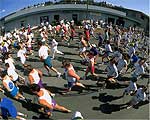 |
Brain Fitness
Exercise saves cognitive abilities in older adults |
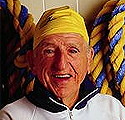 By Melissa Lee Phillips
By Melissa Lee Phillips Neuroscience for Kids Consultant April 9, 2004 Aerobic exercise does remarkable things for the body. It strengthens the lungs, blood vessels, bones, and the heart and other muscles. For older adults, getting the heart pumping faster may also strengthen the mind. A new study offers evidence that regular walking can help prevent the cognitive decline that often accompanies advancing age.
The latest evidence shows that older adults who are aerobically fit are better at attention-demanding tasks than are their unfit counterparts. Stanley Colcombe and his colleagues at the University of Illinois in Urbana-Champaign presented these results in two separate studies in the March 2, 2004, Proceedings of the National Academy of Sciences. The first study tested 41 adults, who were between 55 and 79 years old, on two tasks: a one-mile walk test designed to assess their cardiovascular fitness levels, and a computer task that required them to pay attention to certain items while trying to ignore others. This type of complex attention task is usually very easy for young people, but becomes increasingly difficult as people age.
In the psychologists' second study, 29 non-exercisers aged 58 to 77 started a six-month exercise program, which was supervised by fitness professionals. They were randomly assigned either to a walking (aerobic) group or to a stretching and toning (nonaerobic) group. Before beginning their exercise programs, they performed the same computer-based attention test as in the first study.
This is the first study to use such a high-resolution technology (fMRI) to study the effects of exercise on cognitive capabilities, says Brad Hatfield of the University of Maryland in College Park. "It is a pioneering effort and will probably be a classic," Hatfield says of Colcombe's paper. No one knows the exact neural changes responsible for these types of cognitive improvement in older adults. Studies in animals have suggested that cardiovascular exercise can increase the number of neurons, synapses, and capillaries in the brain, especially in the frontal cortex. One or all of these changes could contribute to improved task performance. Colcombe's study builds on previous work on the role of exercise in maintaining a youthful brain. Other studies have indicated that exercise can prevent neuronal loss in the hippocampus, a brain area important for learning and memory. Also, cardiovascular fitness has been reported to lower risk for Alzheimer's disease. Physical fitness may also be important for some aspects of cognition in children, says Colcombe's colleague Charles Hillman, also at the University of Illinois. Hillman has found that highly fit children between 7 and 11 years old perform an attention task faster and more accurately than their unfit peers. In addition, the fit children's brains exhibited a characteristic pattern of electrical activity that was not matched in their less-fit classmates. So what's the best thing for your brain and your cognitive competence? According to many exercise researchers: start exercising early in life and keep it up over the years. "Of course, there is evidence that exercising can actually 'turn back the clock' to some degree," says Colcombe. "But it remains to be seen whether late-life exercisers can actually catch up to those who start early." |
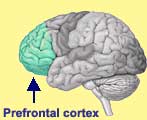 As
adults age, their brain tissue loses density, particularly in the
As
adults age, their brain tissue loses density, particularly in the 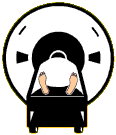 Highly fit participants answered the computer questions more accurately
and more quickly than less-fit subjects did. Functional magnetic
resonance imaging (
Highly fit participants answered the computer questions more accurately
and more quickly than less-fit subjects did. Functional magnetic
resonance imaging (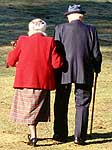 After six months of either aerobic walking or stretching and toning three
times per week, the subjects performed the computer task again. At the end
of the program, the walkers were significantly faster and more accurate at
the attention task than they were before they began exercising. The
stretchers and toners showed no such improvements. And, just as in the
first study, members of the walking group had increased blood flow to
brain areas important for efficient attention and decreased blood flow to
the area linked with indecision. There were no changes in post-program
blood flow in the brains of the stretchers (nonaerobic group).
After six months of either aerobic walking or stretching and toning three
times per week, the subjects performed the computer task again. At the end
of the program, the walkers were significantly faster and more accurate at
the attention task than they were before they began exercising. The
stretchers and toners showed no such improvements. And, just as in the
first study, members of the walking group had increased blood flow to
brain areas important for efficient attention and decreased blood flow to
the area linked with indecision. There were no changes in post-program
blood flow in the brains of the stretchers (nonaerobic group).
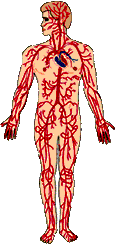
![[email]](./gif/menue.gif)

